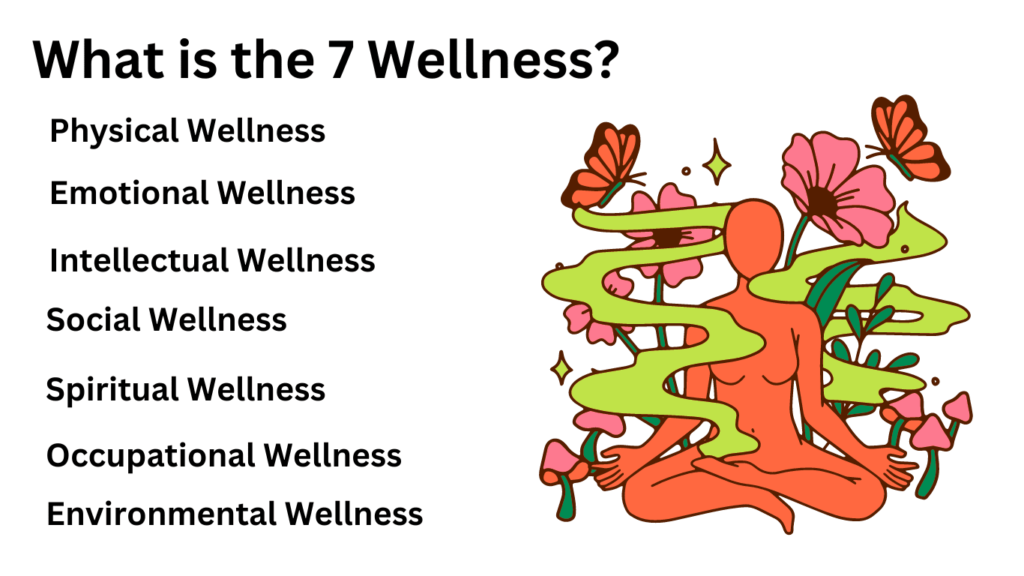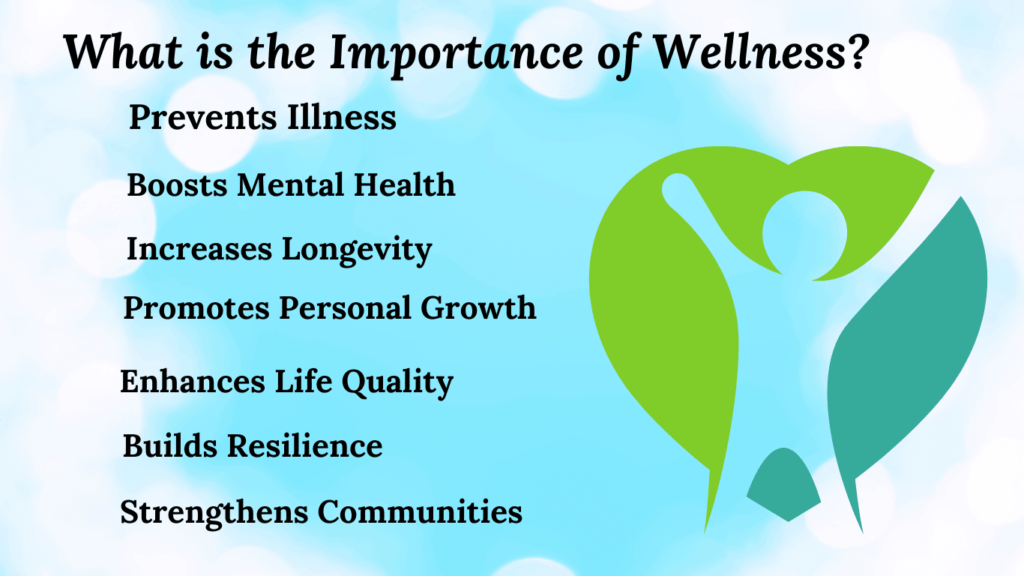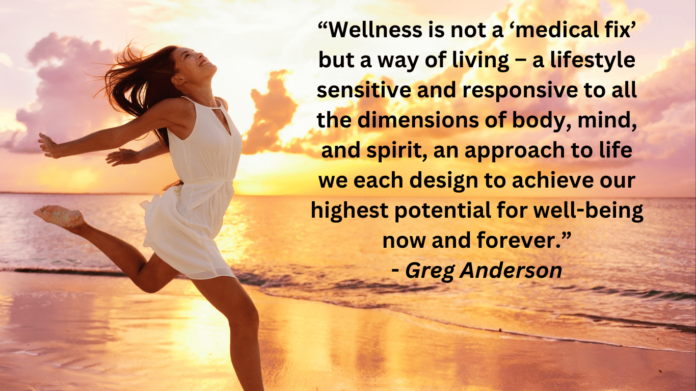What Best Defines Wellness?
Wellness is a holistic approach to health that goes beyond mere physical fitness. It’s a state where the mind, body, and spirit are in harmony, contributing to an overall sense of well-being. Unlike Health, which is often defined by the absence of disease, Wellness is proactive and preventive. It’s about making conscious choices that lead to a fulfilling and balanced life. It is the active pursuit of activities and lifestyles that lead to holistic health. It’s not just about eating right or exercising, it’s about nurturing every aspect of your physical, mental, emotional, and spiritual.
What is the 7 Wellness?

It can be broken down into seven key dimensions, each, essential in achieving overall well-being. Understanding these dimensions can help you take a more balanced approach to your health and life.
Physical Wellness
This is the most commonly recognized dimension of it, focusing on maintaining a healthy body through exercise, nutrition, sleep, and regular medical checkups. It encourages you to care for your body to function optimally and avoid chronic illnesses.
Emotional Wellness
It is about understanding and accepting your feelings. It involves managing stress, expressing emotions appropriately, and building healthy relationships. It helps you cope with life’s challenges and bounce back from setbacks.
Intellectual Wellness
It involves engagement in creative and stimulating activities that expand your knowledge and skills. It’s about keeping your mind sharp through lifelong learning, problem-solving, and critical thinking. This dimension encourages you to be curious and seek out new experiences.
Social Wellness
It is the ability to form and maintain positive relationships with others. It’s about building a support network, developing communication skills, and contributing to your community. Strong social connections are essential for emotional well-being and can boost physical health.
Spiritual Wellness
It is about finding meaning and purpose in life. It involves exploring values, beliefs, and principles that guide your actions. It can be achieved through various practices, such as meditation, prayer, or spending, time in nature, that help you connect with your inner self and the world around you.
Occupational Wellness
It is the ability, to find personal satisfaction and enrichment through your work. It’s about choosing a career that aligns with your values, interests, and talents, and maintaining a healthy work-life balance. It also involves continuous learning and growth in your professional life
Environmental Wellness
It is about living in harmony with the Earth and taking steps to protect it. It involves being aware of your effect on the environment and making choices that contribute to a healthier planet, such as recycling, conserving resources, and reducing waste.
Each of these dimensions is interconnected, meaning that a deficiency in one can affect the others. Striving for balance across all seven dimensions is key to achieving true wellness.
What is the Importance of Wellness?

It is not just a buzzword, it’s a critical component of a healthy, happy, and fulfilling life. Here’s why “Wellness” is so important:
Prevents Illness
Taking care of your wellness can help stop serious health problems like heart disease, diabetes, and obesity. By making healthy choices, you lower your chances of getting these conditions and boost your overall health.
Boosts Mental Health
Wellness activities like mindfulness, meditation, and regular exercise can greatly improve mental health. They help reduce stress, anxiety, and depression, making you feel more positive about life.
Enhances Life Quality
Focusing on overall well being, makes you feel more energetic, motivated, and engaged. It helps you enjoy everyday activities, follow your passions, and build strong relationships
Increases Longevity
Wellness is closely linked to living a longer life. Research shows that people who prioritize to overall well being tend to live longer and healthier. By taking care of your body and mind, you can boost your chances of living a long and vibrant life.
Builds Resilience
Life can be challenging, but having a solid foundation of holistic well being helps you handle stress and bounce back from tough situations. Being physically and emotionally balanced makes it easier to navigate life’s challenges.
Promotes Personal Growth
Wellness isn’t just about staying where you are, it’s about growing and improving. Whether learning something new, developing better habits, or following a passion, it helps you strive for personal excellence.
Strengthens Communities
When you, focus on overall well being, it doesn’t just benefit you—it positively impacts those around you. A healthy and well-balanced person is more likely to contribute to their community, creating a positive ripple effect that improves everyone’s well-being.

In conclusion, Overall well being, is essential for living a balanced and fulfilling life. By understanding the seven dimensions of holistic well being and recognizing its importance, you can take proactive steps to enhance your well-being and achieve your full potential. Whether through physical fitness, emotional resilience, or spiritual growth, the journey to wellness is a lifelong pursuit that can lead to a happier, healthier, and more meaningful life.
FAQ-
Q. Can wellness be achieved at any age?
A. Yes, it can be pursued and achieved at any age. It’s never too late to start making choices that improve your well-being.
Q. How does wellness affect mental health?
A. It has a significant impact on mental health. Practices that promote it such as regular exercise, good nutrition, and stress management, can help improve mood, reduce anxiety and depression, and enhance overall mental clarity.
Q. What role does diet play in wellness?
A. Diet plays a crucial role in overall well being, by providing the nutrients your body needs to function optimally. A balanced diet can boost energy levels, support immune function, and promote physical and mental health.
Q. How can I maintain wellness while managing a busy lifestyle?
A. Maintaining it, in a busy lifestyle involves prioritizing self-care, setting realistic goals, and finding small ways to incorporate wellness into your daily routine, such as taking short breaks, eating healthy snacks, and staying active.
Q. What are some common misconceptions about Wellness?
A. Some common misconceptions about it, include the belief that it requires a lot of time or money, that it’s only about physical health, or that it’s only for people without chronic illnesses. In reality, it is accessible to everyone and encompasses various aspects of life, not just physical health.


Very nice post. I just stumbled upon your weblog and wanted to say that I’ve really enjoyed surfing around your blog posts.
In any case I will be subscribing to your feed and I hope you write again very soon!